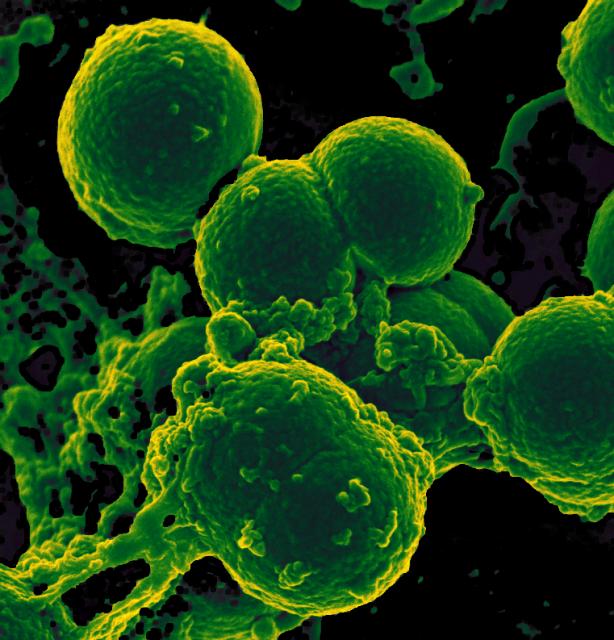Methicillin resistance Staphylococcus
aureus
(MRSA)
Introduction:
Methicillin resistance Staphylococcus aureus or as
called (MRSA), is a type of bacterial infection affecting the skin that is
resistant to antibiotics and is difficult to treat. Also, this disease is a
hospital-acquired infection. This type of disease is hard to recognize only by
tests. And there were many complications if untreated. There are no signs and
symptoms of this disease but if the patient is having any wound in the body it
will have some signs and symptoms.
Signs and symptoms of (MRSA) on the wound:
1- 1- Redness and pain in the wound site
2- 2- Swollen in the wound site
3- 3- Infection in the wound site like oozing, redness, and pus
4- 4- The patient may have a fever due to infection.
Complications of (MRSA):
This disease can cause serious complications if left
untreated. It can cause septicemia which is a bacterial infection that will
affect the blood and bloodstream this can cause serious complications and can
cause death. Also, this bacteria can affect the lungs and cause pneumonia (lung
infection) even can cause serious complications and cause death. So this
disease must be treated as soon as possible when it’s recognized.
Preventive measures for healthcare workers:
This disease mostly is a hospital-acquired infection
so the health care workers must prevent the spread of the disease by taking
many precautions when dealing with patients with MRSA.
1- 1- The patient with MRSA should be isolated to prevent the spread of the
disease to others
2- 2- Clean your hand frequently
3- 3- The health care workers must wear full personal protective equipment to
prevent the spread of the disease to them and to prevent the spread of the
disease to other patients.
4- 4- Clean patient wounds by using aseptic techniques and cover them to
prevent the spread of infection.
5- 5- The patient belongings must not be shared with others.
6- 6- When changing patients bed sheets and towels must be separated when
cleaning and not mixed with other patients’ bed sheets.
7- 7- The health care workers must inform the people who contacted the patient
what precautions must be taken when entering the patient’s room.
8- 8- The swab will be taken regularly from the patient from each area that is
infected to make sure the patient is cured from this disease.
Treatments of MRSA:
The treatment of MRSA started according to the blood
culture that will be done for the patient, antibiotics will be given to the
patient intravenously. Followed 7 to 10 days of oral antibiotics if the patient
was discharged home.
Also, if the patient is having wound culture will be
taken from the wound site and accordingly antibiotic ointments will be
prescribed to the patient to be used in the wound sites.
Moreover, the patient will use good disinfectant soap
while bathing or washing to clean the skin from the bacteria according to the
skin swab test.
Conclusion:
MRSA is a disease that is very hard to treat and prevention
of the disease is most important for the health of the community and society.
The patient who gets an infection must be treated as soon as possible before
the spreads to all body and complications started this can cause very serious
complications and even death.


